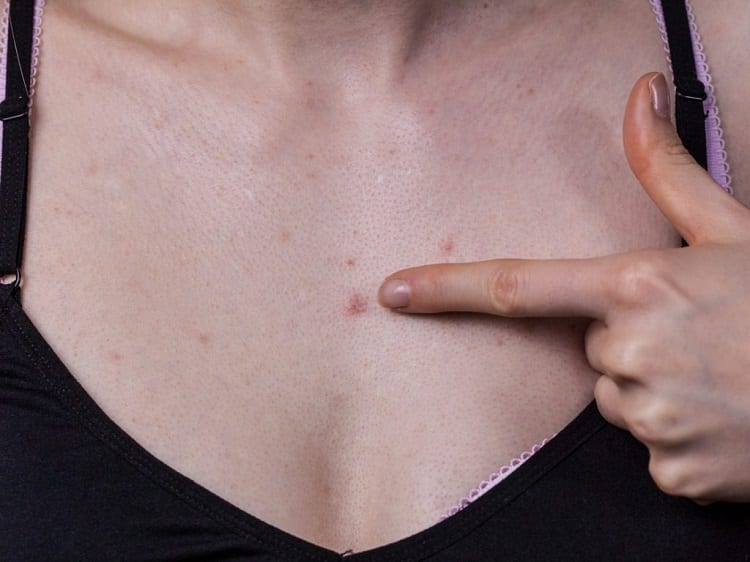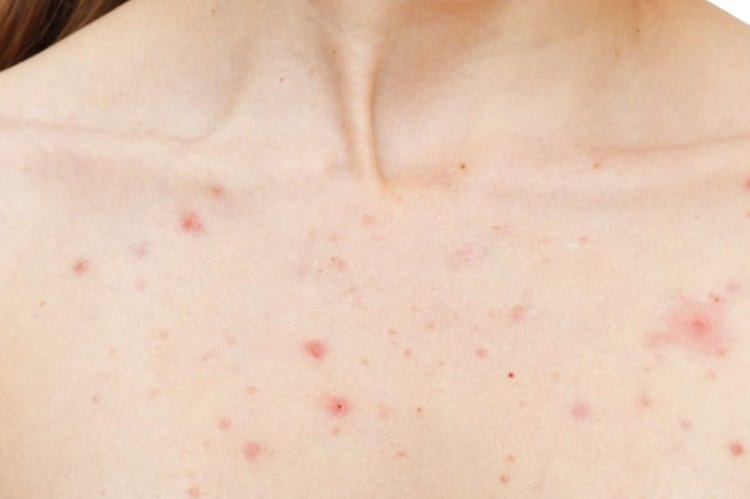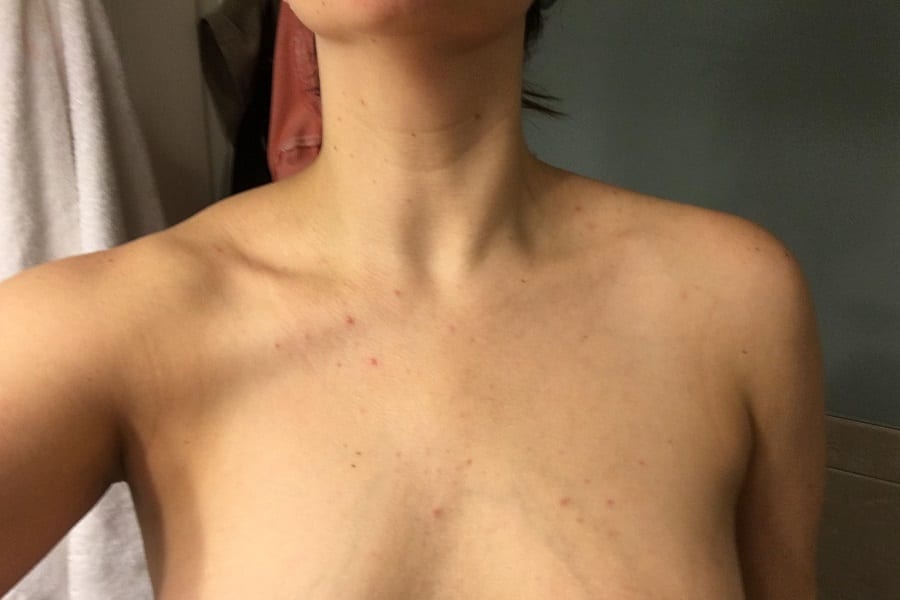Acne is the confidence killer.
While we can feel embarrassed about acne that people see on our face, chest and back acne tears down our confidence without anyone knowing. Not to mention that it hurts!
Chest acne sucks, but it’s there for a reason. We need to find out what that reason is, and a remedy to calmly reduce and remove it without causing skin scarring. Even so, we’ll teach you how to deal with scars, too.
You want to know how to get rid of chest acne, which is why we’ve thrown this guide together for you. We’ll explain what chest acne is, what causes it, and the different treatment options available that can really help you get rid of it once and for all.
Contents
What is Chest Acne?

Similar to acne on your face, back, and other areas of your body, chest acne is simply the presence of acne (blackheads, whiteheads, and red bumps) on your chest.
Just like with normal acne, this is caused with clogged pores, excess sebum (skin oil), and blockages created from dirt through sweating.
Chest acne isn’t really classified as its own type of acne. It’s the same acne you get in other areas of your body. Depending on whether or not you have chest hair, you may notice pain more than others.
One thing to keep in mind is that if you suffer from cystic acne, chest acne comes and stays for far longer than any of us want it to. We’re going to cover the main causes, and go over some treatments to help cancel out chest acne as well.
What Causes Chest Acne?
Chest acne can be caused by a variety of factors, including but not limited to:
Excess Sugar
Sugar forces your body to produce insulin to combat it, and insulin is linked to the increased production in skin oils.
In short, the more sugar in your diet, the worse your acne will become (everywhere on your body).
Hormone Imbalances or Fluctuations
Your pH balance can dry out your skin and cause acne, or simply send the wrong hormones to your skin which can also affect acne.
Your period can cause acne, stress (which affects hormones) can cause acne, basically the list goes on and on.
Dehydration
Your skin requires hydration on a constant basis. Your epidermis (the outermost layer of your skin) received hydration last since it’s furthest from the source.
That means that if your epidermis is dry, your skin underneath is also dry. Dehydration can be fixed on your own without cosmetic intervention, although the damaging effects to your skin can be reversed rather quickly with a quality moisturizer.
Sweating/Working Out
Sweating is good… if you clear it off after you’re done. The reason that using a gym shower may be a good idea (as long as you have shower shoes) is because you want that sweat off of you as soon as possible.
During a workout, while it’s still being produced and pouring out, it’s okay to sit on your skin.
You can probably feel your sweat begin to dry up about five to ten minutes after an intense workout is over, especially if you walk into an air-conditioned environment. That’s when it’s beginning to clog your pores.
Poor Hygiene Habits
Not showering often enough can cause acne. In fact, it’s one of the biggest reasons for acne in the first place.
Your sweat glands are always producing more viscous sweat that spreads and blocks your pores. This forces small abscesses to appear in your hair follicles, resulting in matured hairs that then appear ingrown somehow.
Laundry Detergent Allergy
Acne doesn’t just have to be caused by clogged pores. Irritation to the skin can lead to a reaction that creates irritated red bumps.
While it’s not certain whether or not you’ll receive whiteheads or blackheads as a result, the irritation alone can cause clear pus to leak from your skin.
Makeup and Perfume
Makeup is known to have tons of aggressors in them that irritate your skin and clog your pores, but it turns out perfumes could also be doing the same thing.
When you apply them directly to the skin, carrier oils can clog your pores fairly easily.
Chest Acne Treatment

Now it’s time to find out how you should fight your chest acne.
These are a few basic ways to get rid of it and combat upcoming chest acne, and we’ll throw in some natural in-home remedies afterwards just in case you have sensitive skin.
- Acne-Fighting Body Wash: Body washes help get rid of acne by not only cleaning your skin better than your current body wash or bar soap, but also by introducing bacteria-fighting nutrients that clear your skin
- Exfoliate Regularly: Exfoliation isn’t just for your face; you can exfoliate skin anywhere on your body. Exfoliate the skin on your chest and back once per week to remove excess sebum buildup and dead skill cells.
- Drink More Water: Some acne needs to be treated from the inside out. Hydrate yourself, drink more water, and make a conscious effort every day to finish at least a half-gallon. This takes time, but done consistently, it can lower acne across your entire body.
- Spot Treatment: These work similarly to chemical exfoliators, which use salicylic acid to remove buildup from the surface of your skin. These can be used in oily areas of your skin to remove grease when it feels like scrubbing with body wash just isn’t enough.
- Benzoyl Peroxide: You’ll see this in skin bleaching and lightening creams and treatments. An application of benzoyl peroxide can help remove acne, but just don’t wear clothes that you actually like when you use this. It can bleach those, too.
Natural Remedies
These natural remedies are fast, and while they’re not controlled like medicated shampoo or body wash is, they’ve been proven to be effective as in-home treatments time and time again.
- Apple Cider Vinegar: A bit of this rubbed onto your skin can really help. Organic acids such as citric acid can kill different forms of acne-causing bacteria.
- Zinc Supplements/Through Food: These help your skin and body in a variety of ways. Those with severe acne will see good results from zinc supplements, but mild or moderate acne will only see a minor boost here.
- Tea Tree Oil: Essential oils have their place in skincare (although not so much in medicine), and tea tree oil is among one of the best out there. This may reduce acne on the skin, but also reduce inflammation in the dermis layer.
How to Deal With Scars
Acne scars are stubborn, and it can feel like they’re going to linger around on your skin forever.
Don’t worry; you can reduce their appearance, and even though you may not be able to remove them entirely, you can make them negligible when it comes to how you come off.
First of all, understand the two types of acne scars so you know what you should be treating:
- Hypertrophic: This leads to the presence of raised, bumpy scars that can be seen across your face and body. These do not go away easily with toners and concealers.
- Atrophic: Deep, indentation-like scarring that can be called icepick or boxcar scars. These typically appear like valleys in your skin.
The way to deal with both of these scar types is to get your body to produce collagen, the elastic component to your skin that keeps it looking sleek, young, and vibrant.
This isn’t a one-and-done kind of fix, but a consistent application of a retinoid paired with exfoliators will help.
Retinoids trigger collagen production in the body, or at least they’re designed to do so. You have to remember that your outer layer of skin, which is called the epidermis, is basically all dead skin. To remove some thin layers of that, you need to exfoliate.
For acne scars, use exfoliating face masks when you can (usually once or twice per week). These help to remove lots of dead skin, and can have a quite literal overnight different on your appearance.
It should be noted that while boosting collagen production and removing dead skin from the surface will help, there’s a chance that acne scars will remain.
Using these methods can reduce their appearance, and continued application can make scars fade to the point of not being noticeable.
Dealing With Chest Acne One Step at a Time
You know how to get rid of chest acne, deal with the scars, and you know that it’s an ongoing, uphill battle. It’s not going to be easy, but if anyone can combat it effectively, it’s you.
There are different skin types, and each of them come with their own hurdles. Once you know your skin type, this will be much easier to control as well.
